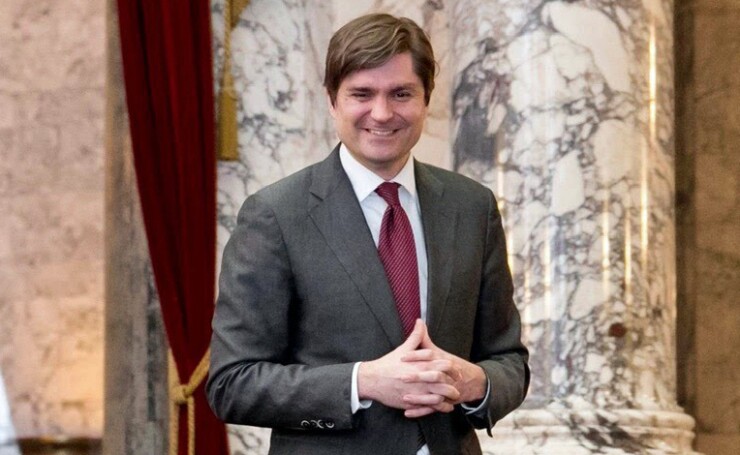Washington state's rating outlook was revised to positive from stable Thursday by S&P Global Ratings, citing the state's growing economy and strong reserves.
The outlook revision means there is a one-in-three chance the state could have its AA-plus rating upgraded to AAA by S&P over the two-year outlook period, said Oscar Padilla, an S&P director.
"The positive outlook reflects our view that the state's positive economic momentum will help support revenue collections over the current biennium, and that the state will demonstrate its commitment to maintaining and replenishing its reserves," S&P analyst Savannah Gilmore said.

Though S&P lauded the state for its reserves, they aren't as high as peer states that hold triple-A ratings, Padilla said.
Padilla pointed to Texas and Florida, which he said have extraordinarily high reserves. While Washington has 3.9% of annualized expenditures in its budget stabilization account and 12.7% in its Washington Rescue Plan Transition account of annualized expenditures, the triple A-rated states are exceeding 16% — and Florida currently has reserves around 30% to 40% over expenditures, he said.
Gilmore also noted that while Washington's reserves in both accounts are above 16% of annualized expenses that could be affected by revisions in the 2024 supplemental budget.
The state's economy has been growing faster than the national economy over most of the past decade, Padilla said, but S&P economists are still predicting a national economic slowdown.
"We will be tracking the factors we mentioned over the two-year outlook period," Gilmore said.
Even with the headwinds facing Boeing, including the Federal Aviation Administration's r
"When the situation with the Max 8 arose, the economy continued to be strong," Padilla said. "With the tech layoffs, people have continued to find high paying jobs and the economic outcomes have continued to be strong."
He added that the Oregon, Idaho and California economies also have continued to do well despite economic headwinds.
Though tech and aerospace continued to be major drivers of the Washington economy, it has also become more diverse. Amazon and Microsoft
In his State of the State speech on Tuesday, Gov. Jay Inslee, who announced he won't run for a fourth term in November, pointed to growth in clean tech jobs, like the 8,000 jobs created through the Pacific Northwest federal hydrogen hub as a bright spot.
"From sustainable aviation fuels and EV battery manufacturing in Moses Lake to electric buses in Ferndale, we're attracting and creating thousands of good-paying jobs in clean energy and clean technology," Inslee said. "And as fossil fuel jobs go away, we're training those workers – the folks who worked at places like TransAlta – for jobs in the new clean energy economy."
The state also raised $1.8 billion in 2023
The act, a key part of Inslee's climate legacy, is being challenged by a Republican-backed initiative on the November ballot that seeks to reverse the policy.
While the clean energy jobs aren't a major part of the state's economy at this point, Padilla noted both aerospace and tech, once new industries in the state, are significant now, so he wouldn't discount the potential for clean energy to be a major economic driver in the future.
The outlook boost comes as
Montague DeRose and Associates and Piper Sandler are municipal advisors; Foster Garvey P.C. is bond counsel.
The state is rated Aaa by Moody's Investors Service and AA-plus by Fitch Ratings. Both assign stable outlooks.
Moody's analysts affirmed the triple-A rating Thursday saying the rating reflects its strong economic fundamentals with real gross domestic product growth consistently outperforming the U.S. with per capita income equal to 104.7% of U.S. income levels even after adjusting for high costs of living, and positive demographic trends. Moody's also cited the state's strong governance practices and sound reserve and liquidity practices.
Fitch affirmed its rating Friday.
Washington's reserve position has strengthened in recent years, Moody's analysts said, with cash basis budgetary reserves reaching $8.0 billion or 24% of near-general fund state revenue as of fiscal end 2023.
S&P's Gilmore and Padilla said in their report that: "Historically, the state's lack of a formal policy for its budget reserve level has allowed low balances to persist through periods of economic and revenue softness."
They added, however, that the state "has consistently rebuilt reserve positions during expansionary economy cycles."
The news of the outlook revision came as Pellicciotti was providing state lawmakers with his annual
"Receiving a 'positive outlook' for the state's credit rating is a key indicator that Washington is crafting sound fiscal policy and putting the state in the best possible financial position going forward," Pelliciotti said in a statement.
The recommendations in the annual debt and credit report "provide a set of financial guardrails designed to help ensure the state's long-term financial security and uphold our strong credit ratings," the treasurer said.
He recommended the state maintain a minimum level of total reserves of no less than 10% of annual general fund revenues; manage future bond issuance plans to ensure they don't exceed target debt service coverage ratios and continue to improve the funding status of the state's pension plans by fully funding the state's actuarially determined pension contributions.
"Keeping financing costs low for capital projects and transportation improvements is as important as ever in today's interest rate environment," Pelliciotti said. "Adhering to these recommendations will keep the state on the right trajectory."
"A credit rating upgrade could translate to lower interest rates on debt issuances and ultimately produce needed cost savings on future state projects," he said.





